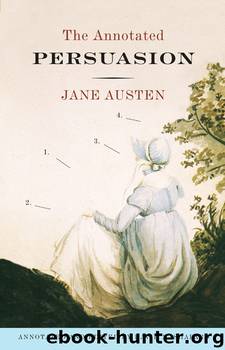The Annotated Persuasion by Jane Austen

Author:Jane Austen [Austen, Jane]
Language: eng
Format: epub
ISBN: 978-0-307-95023-9
Publisher: Knopf Doubleday Publishing Group
Published: 2012-01-24T16:00:00+00:00
VOLUME I, CHAPTER II
1. Mr. Shepherd has already been identified as Sir Walter’s agent (this page). He is an attorney: attorneys constituted the majority of lawyers at the time; unlike the more prestigious barristers, they could not try cases in court. Attorneys’ business consisted principally of property and financial transactions, and they were usually selected by wealthy landowners to manage their estates and finances (see note 19). Some attorneys gave up their normal practice to full-time agents, though a later reference by Mr. Shepherd to consultation on another matter suggests this is not the case with him.
The description of Mr. Shepherd’s possible “hold or his views on Sir Walter” refers to the dependence someone as incapable as Sir Walter of managing his finances might have on the person who does it for him, and the low opinion that close dealings have probably given the attorney of his client. But, as explained, and shown over the next couple of chapters, none of this causes Mr. Shepherd to be other than deferential in speaking to Sir Walter.
2. abilities: mental powers.
3. Respect for those of high rank was a basic tenet of this society. In principle it went along with respect for the high moral standards that those of high rank were supposed to embody. In practice, the latter, as the case of Sir Walter shows, did not always fulfill those standards, and this created a tension, seen in Lady Russell’s attitudes, between moral respect and social respect.
4. good-breeding: politeness, courtesy.
5. cultivated: well-educated, cultured. Lady Russell’s strong interest in books, and regard for those who read, will be mentioned at several points.
6. consequence: social status or distinction.
7. This indicates Jane Austen’s own moral standards. While not condemning all concern for social distinction or deference, she always upholds the primacy of moral considerations. She also takes care to delineate the precise moral virtues and failings of each character, whether explicitly, as in this passage, or implicitly, through showing the character in speech and action.
8. A knight was someone distinguished by the king for meritorious action or service of some kind. The knighthood gave him the right to be called “Sir,” and his wife the right to be called “Lady,” for their lifetimes.
9. This means Lady Russell rents her house from Sir Walter. She had earlier been described as having moved to the village of Kellynch to be near Lady Elliot. Landowners often owned much of the property in the local village; Sir Walter may have already owned a house there, or he may have built one to accommodate his wife’s friend. The house in which Jane Austen lived in the last decade of her life, and wrote most of her novels, was one owned by her brother, whose estate near the village included the house, and who offered it, rent-free, to his mother and sisters.
It is notable that Sir Walter is described as an obliging landlord. This may stem from his regard for Lady Russell as a family friend and a person with a title, or it may reflect his general tendency in such matters.
Download
This site does not store any files on its server. We only index and link to content provided by other sites. Please contact the content providers to delete copyright contents if any and email us, we'll remove relevant links or contents immediately.
| 20th Century | American |
| Ancient World | Medieval |
| Regency | Scottish |
| Tudor | Victorian |
| Viking |
The Highlander's Princess Bride by Vanessa Kelly(8275)
The Lover by Duras Marguerite(7888)
Storm and Silence by Robert Thier(6834)
Devil in Spring: The Ravenels by Lisa Kleypas(6296)
Stormfire by Christine Monson(5766)
London's Perfect Scoundrel by Suzanne Enoch(5423)
Marrying Winterborne by Lisa Kleypas(4905)
In the Midst of Winter by Isabel Allende(4526)
From Sand and Ash by Amy Harmon(4496)
Housekeeping by Marilynne Robinson(4434)
Burning Man by Phillip Margolin(4404)
Once and Always by Judith McNaught(4362)
Under Mr Nolan's Bed by Selena Kitt(4315)
Lady Bridget's Diary by Maya Rodale(4295)
Romancing the Duke Castles Ever After by Tessa Dare(4188)
How to Rescue a Rake by Jayne Fresina(4033)
A Matter of Temptation by Lorraine Heath(3992)
Separate Beds by LaVyrle Spencer(3819)
Seduce Me at Sunrise by Lisa Kleypas(3717)
